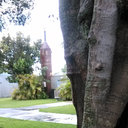Antiproliferation effects of oridonin on HPB-ALL cells and its mechanisms of action.
Հիմնաբառեր
Վերացական
Oridonin, an ent-kaurane diterpenoid derived from the herbal Rabdosia rubescens, has been recently reported to have antitumor effects on a large variety of cancer cells. The present study was undertaken to investigate the in vitro antiproliferation and apoptosis inducing effects of oridonin on HPB-ALL cell lines and its mechanisms of action. HPB-ALL cells in culture medium in vitro were treated with different concentrations of oridonin (16-56 micromol/L). MTT assay was used to detect the cell growth inhibitory rate, and the cell viability was assessed by the trypan blue dye-exclusion method. Cell apoptosis and the mitochondrial membrane potential (delta psi m) were investigated by flow cytometry (FCM), Hoechst 33258 staining, and DNA fragmentation analysis. The expression of caspase-3 and different apoptosis modulators, including Fas and Bcl-2 family members, was analyzed by Western blotting. The results revealed that oridonin could significantly inhibit the growth of HPB-ALL cells and cause apoptosis, and the suppression was both time- and dose-dependent. After treatment with oridonin for 48 hr, the percentage of disruption of delta psi m gradually increased in a dose-dependent manner along with marked changes of cell apoptosis, and necrotic cells increased remarkably after the cells were treated with oridonin for 72 hr; Western blotting showed cleavage of the caspase-3 zymogen protein (32 kDa) with the appearance of its 20-kDa subunit when apoptosis occurred; expression of Bcl-2 and Bcl-XL was downregulated remarkably while expression of Bax and Bid was upregulated concurrently after the cells were treated with oridonin for 24 hr. Of note, the expressions of Fas and other Bcl-2 family members including Bak and Bad remained constant before and after apoptosis occurred. We therefore conclude that oridonin has significant antiproliferation effects on HPB-ALL cells by induction of apoptosis as well as directly causing cell necrosis and that oridonin-induced apoptosis on HPB-ALL cells is mainly related to the disruption of delta psi m and activation of caspase-3 as well as downregulation of anti-apoptotic protein Bcl-2, Bcl-XL, and upregulation of pro-apoptotic proteins Bax and Bid. The results indicate that oridonin may serve as a potential antileukemia reagent.




